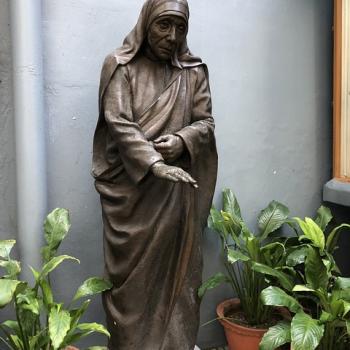Just as a New England-style house will not be very practical in the desert southwest of the U.S., so too will some religious models not be suitable for the spiritual wellbeing of particular groups of people. Likewise, while some portable, generalizable, and somewhat universal mobile home might be a place to live no matter where one is, nonetheless it might not be the best (or most appealing) place to live, particularly if someone has an option for living elsewhere. In terms of the spiritual niche in which one finds oneself and in whose environment one attempts to thrive spiritually, a balance should be struck between the "invasiveness" of a new species (and where, in the modern U.S., is any form of Paganism not viewed as "invasive" by some other religion?), and the local and organic, evolutionarily adapted "indigenous" species.
A study of history, again, demonstrates how true this was of most ancient religions in Europe upon which many forms of modern Paganism are based to some extent. The cult of Zeus in Olympia in Greece was not quite the same as it was at Mt. Lykaion, or in Athens, or in the desert oasis of Siwa in Egypt. Local epithets and particularities always accompanied any deity's cultus in a specific location, no matter what wider origins or shared characteristics of a deity might have been in play in the particular instance. One community's epiphany and understanding of the deity didn't have to be the same as that of another community's a few miles away, nor in a neighboring region, or in a further distant province.
The "Here," "There," and "Anywhere" model can therefore apply to the phenomenon of modern and future Paganism as "niche religions" as well. Paganism-in-general should be something that anyone can do anywhere, and thus the third dimension of this tripartite distinction can be maintained; but, the niche-religion understanding of Paganism would require that any particular "Anywhere" is one that is localized and adapted to the specific population, geography, and culture in which it is found. Likewise, the "There" dimension of religions that have a communal aspect are important, and this would be important to maintain in future forms of Paganism as well; as a niche religion, this "Anywhere" dimension would extend to regional festival spaces, and to some broader (but still adaptable and individualized) movements within Paganism that have common theological expressions and practices. But, perhaps most importantly, both the "Anywhere" and the "There" dimensions of Paganism as a religion in the future will also have to work hand-in-hand with a strong "Here" dimension, because "Here" is where all of us live. And, in that sense, the niche religions paradigm would be most suited for application.
So, what is the particular "Here" from which one is coming? Is it a "Here" with a focus on nature and the seasons? Is it a "Here" that is also heavily invested in the particular and specific landforms, geography, flora and fauna, as well as nature spirits, legends, and local heroes, that are found in the physical location in which one's "Here" happens to be? Is one's "Here" invested in political issues, like feminism, or social justice? Is an individual "Here" interested in particular cultures of the past, particular languages, and specific deities? Perhaps most importantly, what does a given "Here" want out of its religious and spiritual life generally speaking: greater prosperity, physical well-being, and improved relationships? Gaining a general sense of peace in dealing with life's vicissitudes? Putting one's existence into a greater context of cosmological meaning and significance? Imbuing one's life with more celebration and recognition of the passing of ages, seasons, and other significant events in life and the community?
Asking all of these questions will help to identify what particular religious niche one should strive to shape for oneself and one's associates in the particular "Here" of one's future Pagan religion. What this will lead to is a more specialized religion, religious community, and religious structures that will not only be better adapted to serve specific spiritual needs, but that will be continually shaped, adapted, and evolved to improve the participants' engagements with and pursuit of those needs. This will be a Paganism that is often very well-defined in its aims, without being exclusionary or exclusive.
Another thing to consider is that certain essentializing tendencies in spiritual discourse might not allow these niche religions to thrive as easily. There is a great deal of assumption in what, for example, Pagans in general might think about gender roles, and what models of gender are acceptable and can be sanctioned or encouraged within ritual and ceremonial life. But, do these models exclude some people who may be more interested in being comfortable within another niche? These universalizing and essentializing tendencies are often right under the surface of any given situation. Is a non-specific "men's ritual" or "women's ritual," for example, something that will really serve people and given them a greater understanding of themselves and present an opportunity to spiritually flourish, or do these things unwittingly bind and restrict people's individual and future communal actions? To what extent do these "Anywhere" tendencies get in the way of respecting and operating out of our own "Here" existences? Religious rituals, and particularly the great "mysteries" of life, will be better served by being defined and engaged with in contextual, limited, niche religious environments, rather than in some overarching theological framework that is often more imposed than assented to.




